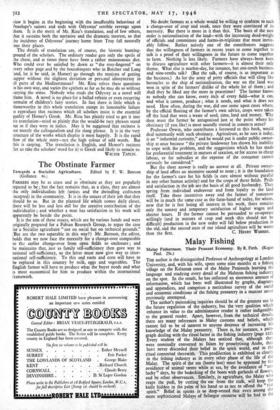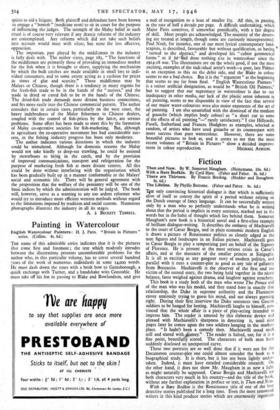Malay Fishing
Malay Fishermen. Their Peasant Economy. By R. Firth. (Kegan Paul. 25s.)
THE author is the distinguished Professor of Anthropology at London University, and, with his wife, spent some nine months at a fishing village on the Kelantan coast of the Malay Peninsula learning the language and studying every detail of the Malayan fishing industry on the spot. In the result, he has collected an enormous amount of information, which has been well illustrated by graphs, diagrams and appendices, and comprises a meticulous survey of the social and economic conditions of the fishing peasantry in a manner never previously attempted. The author's painstaking inquiries should be of the greatest use in the future regulation of the industry, but the very qualities which enhance its value to the administrator render it rather indigestible to the general reader. Apart, however, from the technical details, there are many references to Malay customs and beliefs, which cannot fail to be of interest to anyone desirous of increasing his knowledge of the Malay peasantry. There is, for instance, a para- graph dealing with the ritual factor in the fishing industry (page 522). Every student of the Malays has noticed that, although they were nominally converted to Islam by proselytising Arabs, they have never discarded their belief in the spirit world, and in the ritual connected therewith. This predilection is exhibited as clearly in the fishing industry as in every other phase of the life of the Malay. The spirit of the sea (hantu laut) must be appeased by the avoidance of animal terms while at sea, by the avoidance of "un- lucky " days, by the bedecking of the boats with garlands of flowers, and by other observances. Similarly,, in agriculture, the Malay who reaps the padi, by cutting the ear from the stalk, will keep the knife hidden in the palm of his hand so as not to offend the rice spirit." Belief in spirits is so deep-seated that even among the more sophisticated Malays of Selangor recourse will be had to the
spirits to aid a litigant. Both plaintiff and defendant have been known to engage a " bomoh " (medicine man) to sit in court for the purpose of influencing the judges. The strength of the Malay belief in such ritual is of course very relevant if any drastic reforms of the industry are contemplated. Any reforms which did not take such beliefs into account would meet with silent, but none the less effective, opposition.
The important part played by the middleman in the industry is fully dealt with. The author states, page 185, " The functions of the middlemen are primarily those of providing an immediate market for the fish when it is brought to shore, supplying the mechanism by which the bulk catches are made available in small lots to indi- vidual consumers, and to some extent acting as a cushion for prices in times of glut and scarcity." These middlemen may be Malays or Chinese, though there is a tendency in many regions for the fresh-fish trade to be in the hands of the " natives," and the trade in dried or cured fish to be in the hands of the Chinese. The dried-fish trade demands more distant business connections, and fits more easily into the Chinese commercial pattern. The author considers that in certain cases, particularly on the west coast, the heavy indebtedness of the Malay fishermen to Chinese dealers, coupled with the control of fish-prices by the latter, are serious problems. Some effort has been made to meet this by the formation of Malay co-operative societies for fish-marketing. But, although in agriculture the co-operative movement has had considerable suc- cess, in the fishing industry progress has been only moderate.
The author indicates various directions in which the industry could be stimulated. Although for domestic reasons the Malay would not take kindly to deep-sea trawling, he could be assisted by motorboats to bring in the catch, and by the provision of improved communications, transport and refrigeration for the purpose of marketing fresh fish at more distant centres. All this could be done without interfering with the organisation which has been gradually built up in a manner conformable to the Malays' social and economic life. There will be general agreement with the proposition that the welfare of the peasantry will be one of the basic indices by which the administration will be judged. The book will, however, serve as a warning to any too ardent reformer who would try to introduce more efficient western methods without regard to the limitations imposed by tradition and social custom. Numerous photographs illustrate the industry in all its stages.
A. a BECKETT TERRELL.































 Previous page
Previous page